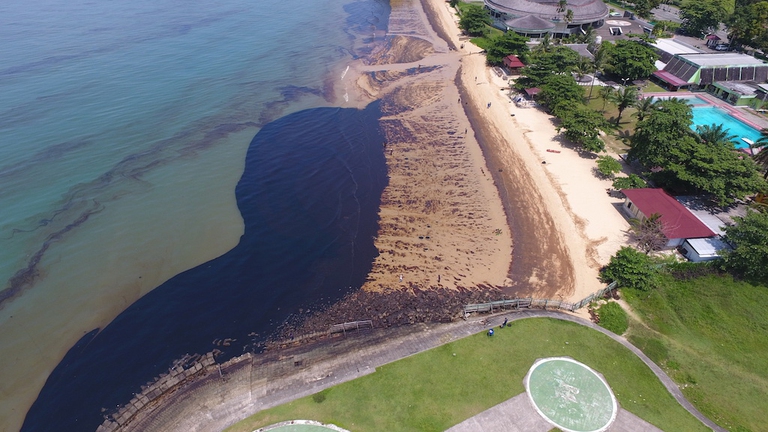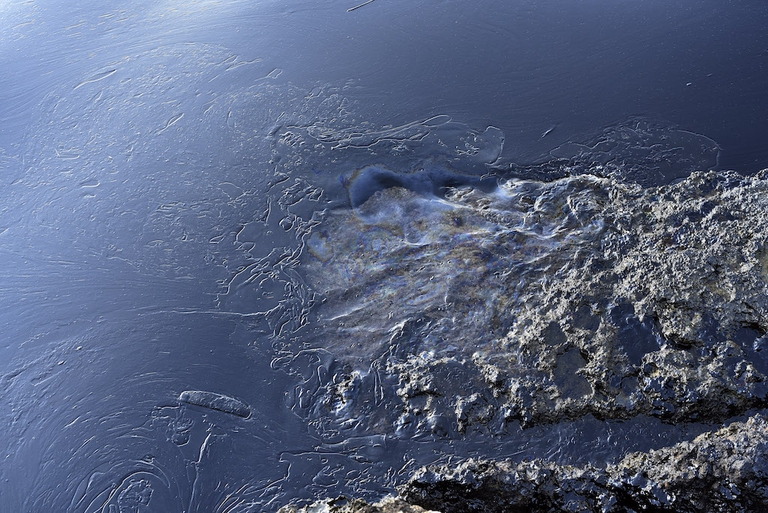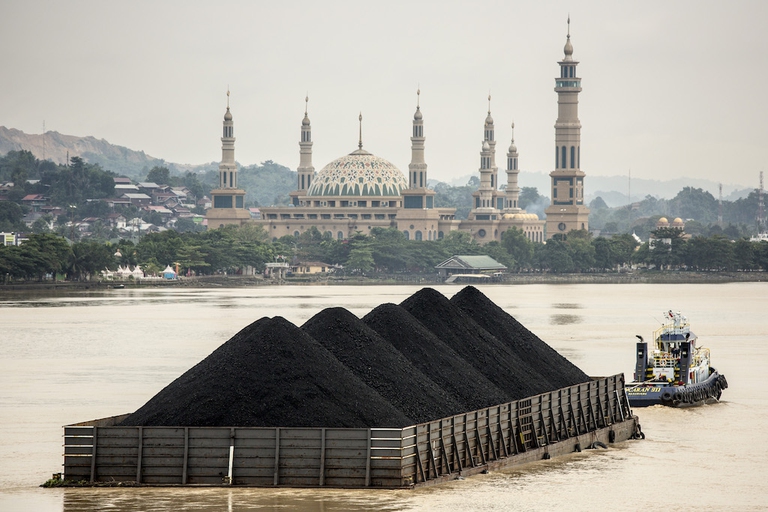
A group of experts in Tokyo suggested pouring radioactive water from Fukushima into the open sea. A marine biochemist explains the consequences of this absurd decision.
The Balikpapan oil spill off the coast or Borneo in Indonesia covers 120 square kilometres. It has caused the death of 5 people, health and economic problems for local communities, as well as threatening wildlife and local ecosystems.
An oil spill occurred in Balikpapan Bay, in the province of East Kalimantan on the island of Borneo – one of the 17,500 that make up the Indonesian archipelago – on the dawn of Saturday 31 March. The spill ignited, causing flames nearly 2 kilometres high according to a senior official from East Borneo’s search and rescue agency. It caused the death of five fishermen, as well as health and economic problems for at least 900,000 local inhabitants. The spill has spread over an area of 120 square kilometres. An investigation has revealed that the crude oil came from a fractured pipe in the Tanjung Penajam line of state-owned energy company Pertamina. In addition, the latest field observations by conservationists from Rare Aquatic Species Indonesia (RASI) confirm that the spill intrusion has gone deep into the estuary ecosystem and mangrove forest.
After the latest sample of the spill was confirmed as crude oil, Pertamina officially announced that a fractured pipe that had shifted about 120 meters from its original position was the likely culprit. Balikpapan is a major mining and energy hub, where Pertamina runs one of its main oil refinery facilities.
The government came to the conclusion that the pipe’s fracture was triggered by the action of a foreign coal vessel, a Panama-flagged MV Ever Judger, that illegally passed through and dropped an anchor in the bay. The government is still investigating what happened to determine the action to be taken towards the vessel’s apparent violation. In the meantime, Pertamina has shut the broken pipeline to prevent further leaks.
The government of Indonesia declared a state of emergency on 2 April. This decision allowed for channelling state funds to enable more coherent and speedier mitigation efforts. The rapid response team is led by the Ministry of Environment and Forestry, and includes the police, navy, national search and rescue agency, and the local government.
For the restoration efforts, Pertamina, who is receiving help from other oil companies, has sent four teams to work simultaneously in four different zones, where 15 vessels have been deployed. As of the evening of 3 April, up to 69,300 cubic metres of crude oil had been collected according to the Ministry of Environment and Forestry’s statement. About 500 volunteers have been recruited to help with the beach cleanup. These come from 67 communities ranging from the military, university students and faculty members as well as businesses. As of 6 April, the clean-up process seemed to show significant results.
The case of Balikpapan oil spill, although far less extensive compared to the 1989 Exxon Valdez in Alaska or the 2010 BP oil spill in the Gulf of Mexico, is substantial enough to make that environmental recovery could take years, even decadesScience has increasingly come to an understanding of the burden that oil spills impose on people and ecosystems. From sea biota such as fish, coral reefs, sea mammals, to mangrove forests, as well as birds and other migrating wildlife that feed from the sea. The first day of the spill alone, specimens of the endangered endemic species of the bay, the Irrawaddy dolphin, were found dead in terrible conditions.
#Indonesia: in corso un disastro ambientale al largo del porto di #Balikpapan, a seguito di una fuoriuscita di petrolio. Secondo i media, sono morti 5 pescatori e centinaia di persone hanno accusato problemi di salute. Queste sono le prime immagini di quanto sta accadendo pic.twitter.com/2MHiZEll37
— Greenpeace Italia (@Greenpeace_ITA) 5 aprile 2018
The immediate effects of oil spills on living creatures derive from: their skin and eyes coming in direct contact with oil, as well as swallowing it, breathing its volatile parts or the smoke caused by its ignition (the latter is suspected to have been the cause of the Irrawaddy dolphins’ death); direct contact with the environment that has been polluted by the spill; consumption of polluted food at any level of food chain. The impact of all these forms of contamination can continue for years afterwards.
According to Doctor Danielle Krebs of Rare Aquatic Species Indonesia (RASI), the spill can break the chain of ecosystem’s functions. The slick that spread into the estuary and mangrove forest has caused damage to the mangrove itself as well as animals that rely on it as their habitat, such as the Bekantan, or long-nosed monkey, fishes and crabs.
The social impact of this tragic accident became evident from the first day and is getting worse as time goes by. At least 1,300 people have reported suffering from breathing problems, nausea and vomiting. Local officials have distributed masks and medical help. A lot of locals work for oil and mining companies in the province but many also rely on trade and fishery activities for their livelihood. Activities in Balikpapan, once an active fishing and trade hub, have been temporarily suspended due to the risk of fire. According to Pradarma Rupang, environmental activist from the Jatam Mining Advocacy Network, economic loss remains to be calculated but people have started to feel the burden. Fishermen have to sail four to six kilometres further away from the bay, which obviously increases fuel consumption and limits catches due to less time at sea. Some of them are still recovering from nausea and vomiting and have totally stopped fishing and engaging in other economic activities.
Social and environmental activists from 23 organisations, including Jatam, Walhi, Greenpeace, YK Rasi have formed a coalition called KMPTM to support locals in filing a class action suit to hold Pertamina responsible for the death of five people, health problems affecting the wider community, as well as social, economic and environmental damages. It’s against the law to dump oil at sea, making oil leaks illegal. Learning from the previous cases when similar incidents occurred in 2004 with the Total Energy company and in May 2017, the community refuses to resort to an administrative solution to the case or year-long police investigations.
#OOTT A MASSIVE OIL SPILL has occurred in Balikpapan Bay, Borneo! The slick is rapidly finding its way quickly into the urban water passages of this 701K populated city. Credit to @OilSheppard #FF for the news link. https://t.co/BJhKK1Nw7e pic.twitter.com/N5716otfqj
— TankerTrackers.com (@TankerTrackers) 4 aprile 2018
Despite the country’s efforts to convert to more sustainable sources of energy, petroleum remains the backbone of energy provision in Indonesia, a country populated by 240 million people. Not only is the burning of fossil fuels a source of CO2 emissions, its exploration and exploitation are capital-intensive, a challenge for the country, and exposes communities and ecosystems to the risk of accidents like the Balikpapan oil spill to occur. Pertamina produces about 800,000 to 1 million barrels of crude oil daily, leaving a 200-400,000 barrels gap to be imported. The spill in Balikpapan, the cost of which has been estimated in a decrease in oil supply of 200,000 barrels a day, is causing the gap to widen even further.
The worst cases of oil spills happened even with leading oil companies in the world, suggesting that even best industry practices aren’t a guarantee that incidents won’t occur. Now the government is tasked with arbitrating the dispute by applying strong and transparent law enforcement, pursuing the investigation until the cause of the incident is clear, avoiding reoccurrence by improving Pertamina’s industrial practices, and, especially, enhancing efforts to alter to more sustainable energy resources.
Siamo anche su WhatsApp. Segui il canale ufficiale LifeGate per restare aggiornata, aggiornato sulle ultime notizie e sulle nostre attività.
![]()
Quest'opera è distribuita con Licenza Creative Commons Attribuzione - Non commerciale - Non opere derivate 4.0 Internazionale.
A group of experts in Tokyo suggested pouring radioactive water from Fukushima into the open sea. A marine biochemist explains the consequences of this absurd decision.
A federal court in Washington, D.C. has struck down the Dakota Access Pipeline, following years of campaigning by the Standing Rock Sioux tribe.
The Scottish island of Eigg is self-sufficient for its energy needs, relying almost entirely on renewable sources, especially thanks to a coordinated community effort.
President Magufuli in unmovable in going ahead with the Stiegler’s Gorge dam despite conservationists’ warnings of the damage it will cause the Selous Game Reserve’s ecosystem and wildlife.
A large dam along the Luangwa River in Zambia would have posed a serious risk to local people and wildlife, leading hundreds of thousands to oppose it. A call to which the government responded by halting plans to build it.
The first one megawatt solar power plant in the Chernobyl exclusion zone has become operational. This is the first step in a renewable energy development project promoted by the Ukrainian government in the area.
A tanker exploded at a gas and petrol station in Nigeria’s Nasarawa state on the 10th of September, killing 35 people and leaving some burned beyond recognition; 3 citizens had several spine and brain injuries, 2 of them are still on Intesive Care Units. Fela Habila , a local singer, is now stable and out of danger but
The largest tidal power plant in the world will be built in the Larantuka Straits. It will serve 100,000 people and help overcome some of the challenges of energy provision in Indonesia.
Robben Island’s solar energy micro-grid project will produce almost one million kilowatt hours of electricity annually, significantly reducing the cost and impact of buying diesel.










